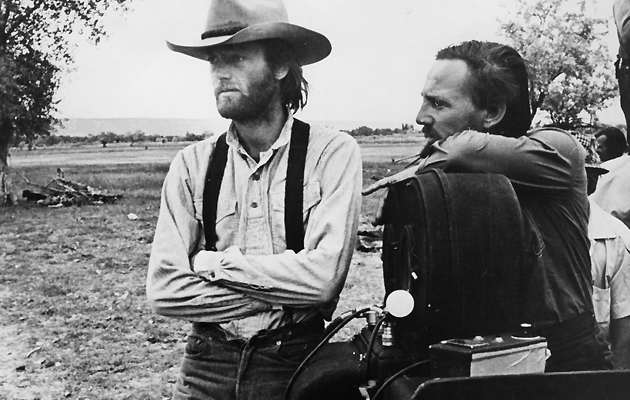I’m speaking with Fonda today, though, to talk about what happened just after that. All the studios were baffled by Easy Rider, but Universal must have felt it had captured the counter-cultural golden geese when it signed both him and Hopper to make their follow-up movies.
Given a contract guaranteeing creative carte-blanche (the likes of which hadn’t been seen since RKO signed Welles in 1939, hoping he’d repeat the success of his Martian invasion radio broadcast), Hopper went off on the Peruvian odyssey that became The Last Movie (1971). For his part, Fonda – after joining Hopper’s crew to play a cameo – grew a scraggy beard and headed for Utah with Warren Oates and Verna Bloom (fresh from Haskell Wexler’s 1969 Chicago-riots document, Medium Cool), to direct his first film, a strange, slow-moving Western called The Hired Hand (1971).
Then, though, the revolution ran into a brick wall. Both The Last Movie and The Hired Hand died at the box office, and celebratory cocktail cabinets started opening in the offices of studio executives who’d known it had been a fluke all along.
Audiences looking for the further adventures of Captain America drifted away from Fonda’s movie disappointed. The Hired Hand had no bikes, no drugs. No Steppenwolf. Few people even found the film at all – it was given only a desultory release by a studio that didn’t seem to care about it, effectively buried. “It only had two weeks in 52 theatres in the United States,” Fonda recalls. “They had no intention, I think, of getting behind it. They hated me and Hopper, but mostly me and [Easy Rider co-producer] Bert Schneider. Yeah, they thought we were trying to overthrow the system.
“I mean, how egotistical. Overthrow the government, yeah,” he laughs. “But Hollywood? Jesus, no…”
After 30 years of near-obscurity, seen only occasionally in a drastically recut, washed-out television version, The Hired Hand is finally being rereleased in a rich new print, lovingly restored to its original tender glory.
Scripted by Alan Sharp – the Scottish writer who went on to write the brutal Robert Aldrich/ Burt Lancaster Western Ulzana’s Raid (1972), Arthur Penn’s superb Night Moves (1975), and Peckinpah’s demented The Osterman Weekend (1983) – the film unfolds like a cowpoke Odyssey, one with a surprisingly feminist slant.
Fonda plays Harry Collings, a drifter pointlessly wandering the west with his saddletramp friend, Arch (Oates). Weary of the life, and the random violence endemic on the plains, Harry finally decides to return to the wife, Hannah (Bloom), and child he deserted seven years previously. But arriving back at the old farm, he finds Hannah has outgrown him, and become a determinedly independent woman.
She has no use for him as a husband, but she agrees to allow him and Arch to stay and work the land as hired hands. Eventually, feeling drawn to Hannah, Arch decides to leave, and Harry and his wife begin living together as a married couple again. Their idyll is interrupted, however, when word comes that old trouble has caught up with Arch out in the wilderness, and Harry has to abandon his family once more, and ride to the rescue.
Three decades on, The Hired Hand remains a strange, surprising movie. Partly a ritualistic western, down to the climactic showdown, it’s mostly a slow, spare meditation on the impossibility of going home again, man’s relationship with nature, and, most unexpected, the place a strong-willed woman could reluctantly carve in the west of the 1880s – there’s a quietly startling scene as Bloom recounts the string of one-night stands she instigated after Fonda left.
Fonda’s hesitant performance as a raggedy cowboy saint with no idea what he wants is keyed exactly to the mood of the movie, like an unshaven cross between his father and Clint Eastwood, after they’ve had all the certainty kicked out of them. He’s eclipsed, however, by Bloom and Oates’ depth-charged reserve: their scenes together are nuanced ballads of call and response.
As director, Fonda allows his film to develop at a serene, contemplative pace that stands out against the cut-up rush of most Hollywood product today even more than it did in 1971. Regarding the landscape with hallucinogenic intensity, the slow-burning montage sequences assembled by editor Frank Mazzola (a longtime collaborator of Donald Cammell) add deep texture, and seem to stretch time out. With its feel for landscape – near-gothic plains, meadows droning with golden-hour sunlight – and sudden bursts of violence, Fonda’s film is close to the west Cormac McCarthy suggests in his books. It’s a film that makes you regret that Fonda didn’t direct more often.
For Fonda, this film, the project he turned to as his first marriage was breaking up, was always a labour of love; so much so that he and his producing partner, William L Hayward (another Easy Rider veteran), agreed to forgo their fees so as to be able to afford Oates. Fonda and Oates became lifelong friends, and would make another two movies together before the older actor’s untimely death in 1982: 92 In The Shade (1975) a wayward, black-comic meander about Florida fishermen; and Race With The Devil (1975), a truly phenomenal B-Movie about vacationing bike-shop magnates being chased by backcountry Satanists, which plays like a sold-out Easy Rider crashing into The Wicker Man.



